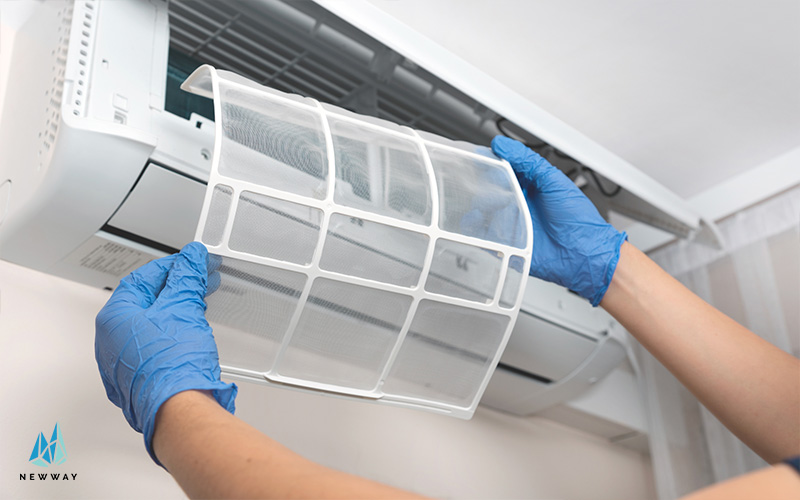PART 1 – INTRODUCTION
Air conditioners are undeniably an absolute necessity in Singapore, where the weather is hot and humid year-round. They work constantly to combat the sweltering heat and humidity of the tropical climate, offering comfort and enhancing productivity in residential and commercial settings alike.
However, just like any other machinery, these appliances need regular servicing and maintenance to perform at their best. Failing to service them may lead to sudden breakdowns, inefficient operations, and other disastrous consequences. Scheduling regular air conditioning services is key to prolonging your unit’s lifespan and safeguarding your investment.
In this article, we delve into everything about aircon servicing in Singapore, from routine maintenance practices to troubleshooting common issues, to help you stay proactive in maintaining your air conditioning system for a cool, comfortable environment at all times.
PART 2 – THE ROLE OF AIRCON SERVICING
2.1 Common Air Conditioning System Issues
Air conditioning systems serve as essential fixtures in regions plagued by persistent heat and humidity. Not only do they offer relief from the oppressive heat, but they also play a vital role in preserving the integrity of buildings and infrastructure by removing excessive moisture that can foster mould growth. However, this does not mean that they are safe from problems that can disrupt their operation and efficiency. Take a look at some common issues you need to be aware of below:
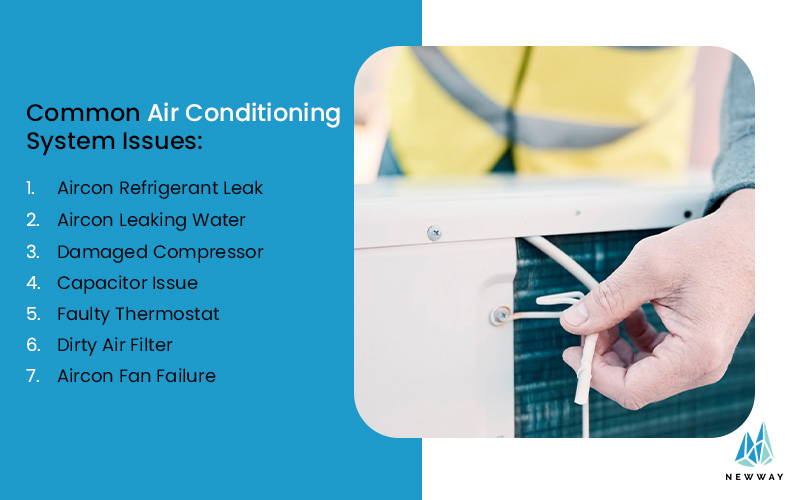
1. Aircon Refrigerant Leak
Is your air conditioner not as cold as before? If you answered yes, your system might be experiencing a refrigerant leak, which may occur due to degraded connections within the system. Over time, the seals and fittings connecting various air conditioner components may wear and tear, resulting in the appearance of small gaps or cracks that allow refrigerants to leak out. Physical damage to the unit, whether caused by accidental impacts, corrosion due to harsh weather conditions, or vandalism, can also weaken the air conditioner’s structural integrity and create openings through which refrigerant escapes.
2. Aircon Leaking Water
An aircon that’s leaking water can be linked to a clogged condensate drain. The drain is designed to remove excess moisture generated during the cooling process, directing condensate water away from the unit to maintain ideal indoor humidity. When it is blocked with contaminants like dirt, dust, or algae, the water flow may become obstructed and build up in the aircon unit, eventually leading to overflows and leaks. On top of that, a malfunctioning condensate pump is likely to cause the air conditioner to leak water too. As the pump fails to dispose of accumulated water from the system efficiently, the water will continue to back up within the unit and cause water damage.
3. Damaged Compressor
The compressor is responsible for heat exchange and pressure regulation of refrigerants. During the cooling process, the component compresses low-pressure, low-temperature refrigerant vapour into a high-pressure, high-temperature gas. It then allows liquid refrigerant to absorb heat from indoor air and cool it. However, the compressor may fail when there are dirty coils, changes in refrigerant levels, and lack of lubrication. When there is insufficient refrigerant, the compressor could overheat and even break down; while too much refrigerant may exert excessive pressure within the unit.
4. Capacitor Issue
When a capacitor malfunctions, you may find it difficult to start your air conditioning system as it wouldn’t be supplied with the required electrical boost for motor operation. This then leads to intermittent cooling, making it challenging for the system to maintain a comfortable indoor temperature. By engaging an aircon contractor promptly, you’ll be able to address these capacitor issues, preventing additional damage to other components of the air conditioner.
Learn more: 8 Factors to Consider When Choosing an Aircon Contractor
5. Faulty Thermostat
A thermostat is a device in the air conditioner that senses and controls room temperature by activating the cooling or heating system accordingly. Here are some signs of a malfunction:
- Inconsistent temperature control
- Inaccurate temperature readings
- Unresponsive temperature controls
- Short cycling of the air conditioner
Various factors can contribute to thermostat failures, including age-related wear, wiring issues, and the buildup of impurities internally. Addressing these issues typically require troubleshooting and repairs performed by a qualified HVAC technician. By accurately diagnosing the underlying problems, these professionals can help restore the thermostat’s proper functioning.
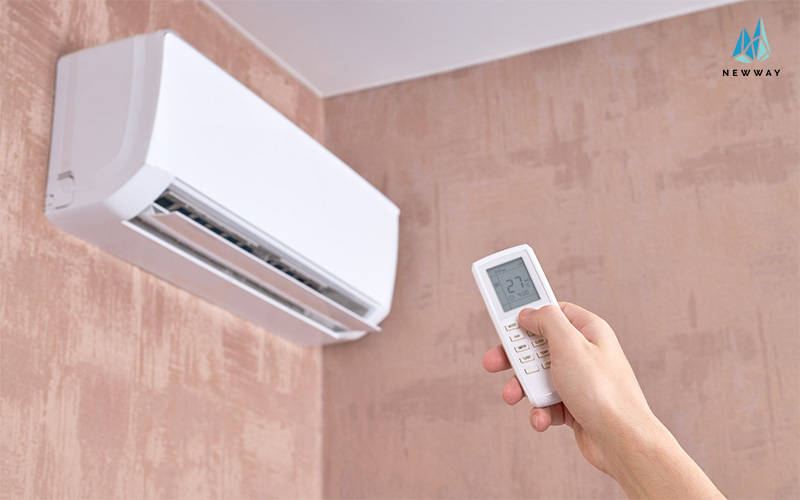
6. Dirty Air Filter
Dirty air filters are inevitable as an air conditioning system ages. When these filters become clogged with debris, they hinder airflow through the system, making it difficult for cool air to reach every part of your home effectively. This forces your air conditioner to work harder to maintain the desired temperature. Consequently, energy consumption increases as the system’s components overwork. For peak performance, it’s advisable to arrange routine aircon cleaning services to maintain clean and unobstructed filters.
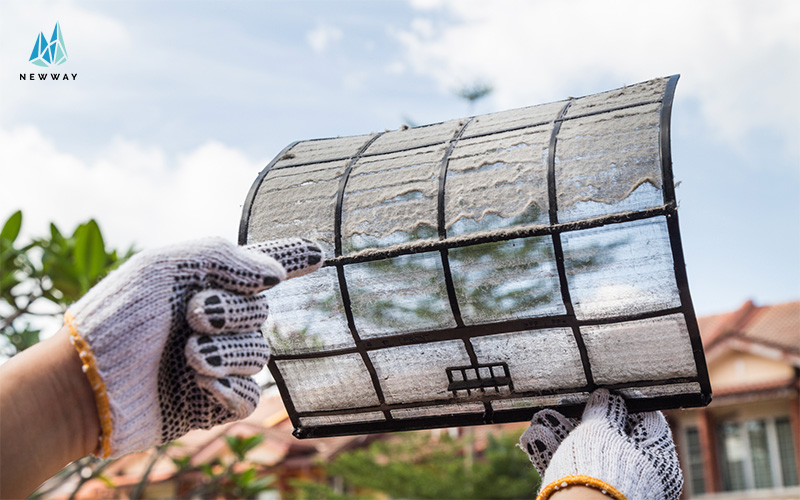
7. Aircon Fan Failure
Aircon fans are essential in circulating air within the air conditioner, facilitating the cooling and dehumidification process for a comfortable indoor environment. When these fail, it not only compromises the airflow, but also prolongs cooling times and exerts excessive strain on other components. Some causes of the failure include:
- Motor Issues
Wear and tear of the air conditioning system can lead to mechanical failure or electrical issues such as burnt coils or damaged wiring. When there are faulty components, the fan motor will fail to operate.
- Overheating
When airflow is blocked, excessive heat can build up within the air conditioning unit. The issue further brings damage to critical components like the fan motor.
- Lubrication Problems
Be mindful that insufficient lubrication of the fan motor bearings can potentially impact overall performance. It increases friction between moving parts, causing the bearings to deteriorate after some time. This misalignment and irregular operation will cause the fan to fail.
2.2 Scope of Work For Aircon Troubleshooting
Like any complex mechanical system, air conditioners are susceptible to faults and malfunctions after a period of use. Thorough inspections should be implemented to determine and resolve issues affecting the system’s operation. In this section, we share more about the comprehensive scope of work for aircon troubleshooting in Singapore, shedding light on how professional HVAC servicing companies like Newway carry out the process and why you should hire an expert for such tasks.
1. Check for Potential Faults
The first step in aircon troubleshooting involves conducting an in-depth examination of the air conditioning unit. Technicians will inspect all components, including the compressor, evaporator coil, condenser coil, fan motor, and thermostat, for signs of damage, wear, or malfunction. The key is to identify existing or potential issues that may affect its performance.
2. Monitor the Error Codes (If Any)
Error codes in an air conditioning system are numbers or letters displayed by the control board or blinking indicator lights to signal / show specific problems. They help technicians diagnose issues faster by providing insights into what’s wrong and where it’s happening. During the process, professionals utilise diagnostic tools to interpret these codes, then verify their accuracy for proper diagnosis of the underlying issues.
3. Prepare Troubleshooting Report
It is important to document all identified faults, such as their severity, nature, and potential causes, in a comprehensive troubleshooting report. This record enables HVAC technicians to monitor the air conditioning unit’s performance history and identify any recurring issues. Additionally, professionals are also able to analyse valuable information from the report to devise effective solutions.
4. Recommend Corrective Aircon Repair Measures
After conducting the troubleshooting process, skilled aircon contractors will suggest suitable repair measures to fix the identified faults. For example, what the proposed repair work does, its benefits, and the costs involved. Walking you through the rationale behind each recommendation will reassure you that your aircon is in good hands.
5. Prepare a Detailed Quotation
Next, a detailed quotation outlining the costs associated with labour, parts, and any additional services required, will be prepared to ensure service transparency. This breakdown of expenses helps you make informed decisions about the repairs.
6. Discuss the Quotation With the Customer
The final phase of aircon troubleshooting is when HVAC technicians present their findings from the troubleshooting process and discuss with customers about the repair procedures and associated costs specified in the quotation. During this discussion, customers are encouraged to address any questions or concerns they may have.
2.3 Air Conditioner Servicing: A Step-by-step Guide
Air conditioner servicing plays a part in maintaining efficient system operations. If you’d like to enjoy the comfort of a cool indoor environment, it’s vital to dive into the step-by-step process of aircon servicing to prevent expensive repairs later on. Keep reading to find out more.
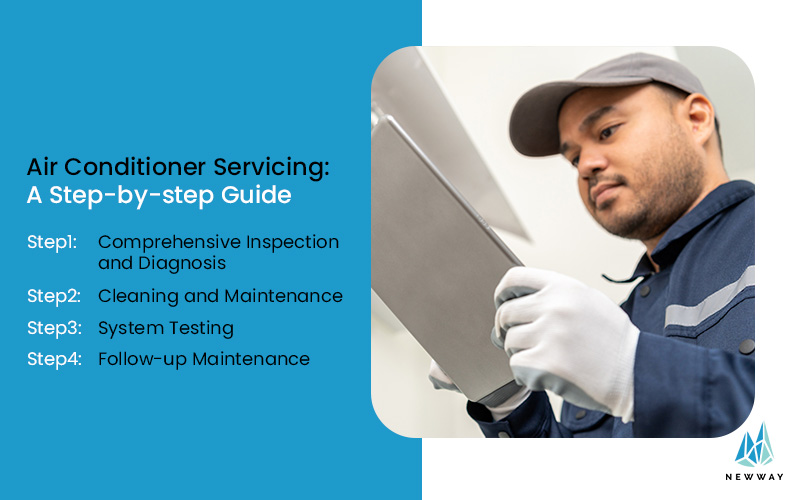
Step 1: Comprehensive Inspection and Diagnosis
Air conditioner servicing typically begins with a comprehensive assessment. During this initial phase, skilled technicians will work to identify any potential issues or malfunctions that require intervention before they start to affect the system’s performance. For example, an AC condenser leak fix. In addition to inspecting the inner components, these professionals also carefully check the outdoor unit to ensure it’s working properly and free from any blockages.
Step 2: Cleaning and Maintenance
During the second step, the professionals will perform a thorough cleaning of components such as the air filter, evaporator coil, and condenser coil to eliminate dust and debris. They also replace clogged air filters to ensure smooth airflow. If you’re suffering in the hot and humid climate in Singapore, it’s advisable to engage professional aircon maintenance regularly. This not only helps alleviate the strain on air conditioning units, but also potentially reduces energy consumption.
Step 3: System Testing
Once cleaning and maintenance tasks are complete, HVAC technicians will carry out testing of the air conditioning system to guarantee everything is functioning the way it should. This includes checking temperature and humidity control, airflow, and refrigerant levels to verify optimal performance and efficiency.
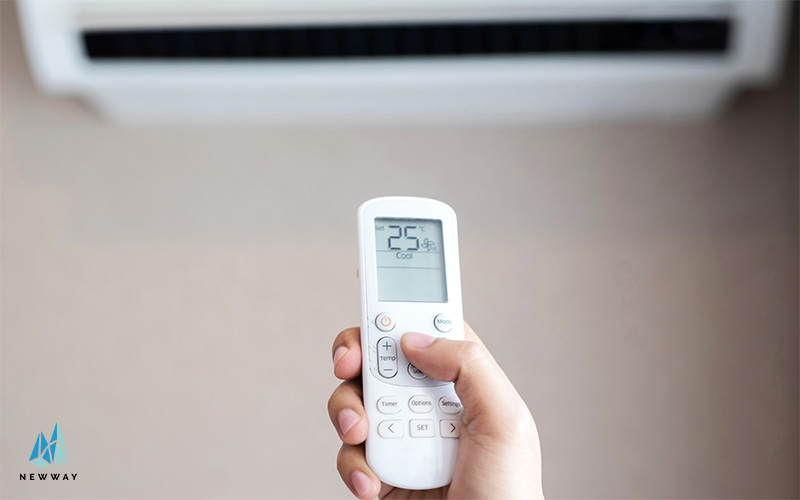
Step 4: Follow-up Maintenance
To maintain the longevity and efficiency of your air conditioning system, follow-up maintenance appointments are highly recommended. During these appointments, you will see technicians perform additional maintenance tasks and address any concerns or issues if necessary.
PART 3 – WHAT YOU SHOULD KNOW ABOUT ERROR CODES AND INDOOR AIR QUALITY
3.1. What Are Error Codes?
Error codes act as indicators of underlying issues within the air conditioning system, each carrying a specific meaning to offer insights into the problem’s nature and required actions for resolution. When error occurs, the unit usually shuts down to prevent additional damage. Also, it’s important to note that these codes vary among different manufacturers of air conditioning systems.
When encountering an error code, users have two primary courses of action:
1. Reset the System
- Unplug the air conditioning system from its power supply.
- Turn off the isolator located next to the outdoor unit or shut down the house’s power from the electrical board.
- Leave the system disconnected for 15–30 minutes to clear the onboard memory.
- Restart the system.
- If the fault persists, seek professional assistance.
2. Seek Professional Assistance
- Consider scheduling appointments with recommended aircon contractors to check the system’s functionality.
- Professional assistance usually involves in-depth diagnosis and resolution of the underlying issues. Count on their expertise to restore your air conditioning system to optimal performance.
3.1.1 List of Error Codes
Are you a homeowner troubleshooting a minor issue? Or seeking professional HVAC services to tackle complex repairs? Refer to the following list of error codes from several renowned aircon brands now to decipher what your aircon is telling you.
- Daikin Error Code
- Fujitsu Error Code
- Mitsubishi Error Code
- Panasonic Error Code
- Hitachi Error Code
- LG Error Code
- Midea Error Code
- Prism+ Zero Troubleshooting Guide
Learn more: Aircon Brands Review – Which Aircon To Buy In Singapore
3.2 Indoor Air Quality
Indoor Air Quality (IAQ) refers to the air standard within and around buildings. If compromised, it may affect respiratory health and impact individuals’ well-being, cognitive function, and overall comfort levels. Poor IAQ can stem from various factors such as inadequate ventilation, indoor pollution sources, and high levels of humidity or mould. Therefore, regular indoor air quality inspections should be performed to maintain optimal IAQ for a healthy indoor environment. To help you see the importance of good IAQ, here are the adverse impacts poor air can cause:
1. Immediate Effects
Immediate reactions to indoor air pollutants are symptoms or effects that occur shortly after exposure to poor indoor air quality. Depending on age, pre-existing medical conditions, individual sensitivity, and environmental factors, the symptoms you suffer from can range from mild to severe. These reactions can typically be short-term and alleviated by eliminating exposure to the pollutant source, or more serious and require medical attention. Affected individuals may suffer irritation of the eyes, nose, and throat, accompanied by headaches, dizziness, and fatigue, among other symptoms.

2. Long-term Effects
Poor IAQ can have long-term effects that emerge years later or after prolonged exposure to pollutants too. These effects can range from respiratory diseases and cardiovascular conditions to more severe health risks, such as cancer.
3.2.1 What Causes Indoor Air Problems?
While the lack of cleaning and dirty air filters in your aircon can cause poor indoor air quality, there are many other contributing factors too.
1. Inadequate Ventilation
Proper ventilation systems allow a continuous flow of outdoor air that lowers the concentration of indoor pollutants in your air, maintaining a healthier indoor environment. Conversely, inadequate air circulation leads to a buildup of indoor pollutants, which can compromise air quality and even pose potential health risks for occupants.
2. Biological Contaminants
Biological contaminants like mould, bacteria, viruses, pollen, and dust mites can flourish indoors, particularly in damp, water-damaged, or highly humid environments. These harmful allergens are capable of triggering allergic reactions in vulnerable individuals – those with allergies or weakened immune systems. Inhaling them can irritate the respiratory system, leading to symptoms like sneezing, coughing, wheezing, and nasal congestion.
Learn more: Coronavirus FAQ: Will Your Aircon Spread Germs?
3. Volatile Organic Compounds (VOCs)
VOCs are chemicals emitted by many household products and materials like paints, cleaning agents, and furnishings. Prolonged exposure to VOCs may cause respiratory irritation, headaches, and dizziness. Worse still, they can pose long-term health effects, such as damage to your kidneys and central nervous system. To mitigate these risks, simply opt for products with minimal to no VOC emissions.
3.3 How Air Conditioning Enhances Indoor Air Quality
Beyond simply providing comfort, modern air conditioning units feature advanced filtration technologies that capture and remove airborne pollutants to create optimal indoor environments.
1. Filtration System
Air conditioning filtration systems work to capture and remove airborne particles and outdoor pollutants, including those from vehicle exhausts, to achieve good indoor air quality. Utilising high-efficiency particulate air (HEPA) filters enhances this cleaning process by effectively trapping even smaller particles for cleaner air. Moreover, these integrated advanced filtration technologies can remove harmful pathogens from the air to minimise the risk of airborne transmission of diseases
2. Ventilation
Thanks to air conditioning systems, a comfortable living environment is no longer wishful thinking. These systems facilitate proper ventilation by exchanging indoor air with fresh outdoor air, continuously diluting indoor pollutants and preventing contaminant accumulation.
3. Humidity Control
Your health is closely related to indoor humidity levels. By reducing excessive moisture, humidity control systems help create a less hospitable environment for mould, mildew, and other biological contaminants to thrive, delivering safer and healthier spaces for your body.
Newway’s Basic Probiotic Hydroclean Solution
At Newway, the health and well-being of our customers are always the top priority when it comes to providing air conditioning services. We recognise the growing awareness among our customers regarding using safe cleaning products, which is particularly crucial for households with young children, elderly individuals, or pets, where health and safety are non-negotiable.
In line with our commitment to our customers’ well-being and environmental sustainability, we’re proud to introduce the Basic Probiotic Hydroclean, an innovative solution that utilises 100% safe and natural cleaning solutions to effectively eliminate dirt, dust, and contaminants from air conditioning units.
Furthermore, our eco-friendly water blasters are designed to clean thoroughly without causing any damage to delicate cooling coil fins. This ensures not only the cleanliness of air conditioning units but also their optimal functioning, promoting energy efficiency and extending the equipment’s lifespan.
3.4 Questions You May Have
1. Why is regular aircon servicing important?
Regular aircon servicing is essential to maintain optimal aircon performance. They help to identify and address potential issues before they escalate.
2. How often should I service my air conditioner?
We recommend scheduling air conditioner servicing three to four times annually to maintain peak performance. In cases of high usage or any observed issues, more frequent servicing may be necessary.
3. Can I service my aircon on my own?
While basic maintenance tasks like cleaning filters can be done by yourself, do approach professional aircon companies for comprehensive servicing. DIY attempts may lead to damage or incomplete maintenance and even affect your aircon unit’s performance.
CONCLUSION
Keep in mind that a well-maintained air conditioning system translates to overall comfort and air purity. By understanding the variables that influence indoor air quality and acknowledging the significance of aircon maintenance in Singapore, you can always make educated choices in maintaining the condition of your air conditioning unit. Consider their professionalism in routine inspections and adherence to industry best practices.
Since 1987, Newway has been enhancing the cooling experience for both residential and commercial air conditioning customers. Our comprehensive service covers chemical wash, troubleshooting, and aircon leaking services in Singapore.
Get in touch with us now to find out more.


